- Getting around Lijiang. Dont stay in the Old Towns more than 2 days, there is nothing to do. KRISS Oct 9, 2013 05:46
- 2013 Beijing Temple Fair BENNYLAU Feb 26, 2013 03:29
- Malaysian traveling from KUL - LAX vis Shanghai PVG ZATI_DY Jan 3, 2013 20:15
Somewhere off the coast of Liaoning...
- Views: 5710
- |Vote: 0 0
- |Add to Favorites
- |Recommend to Friends
Sometimes it’s difficult to know whether to write about a place or not.
There’s a legend in Scotland about a town called Brigadoon. Once every Century the town appears in the ghostly Scottish mists and if you happen to stumble upon this town you must stay and never leave. The citizens of Brigadoon only age a day in every 100 years, which is part of the seductive nature of this place, where youth stretches on into the distance whilst the rest of the world has used up an entire lifetime.
This has little to do with China, but it resonates with an island that lies somewhere off the coast of Liaoning Province. An island that may or may not exist for it might have been a dream. An island that is worth seeking out if you’re fond of blue skies, the tang of salty air, fresh seafood and, of course, if you believe in such things.
Dalu Dao (大鹿岛) is one of those places you won’t find in the guidebooks. It’s a Dongbei (North East) local’s hideaway for those with time on their hands and a hankering to escape from the grime, industry and breakneck pace of city living. It’s down-to-earth and caters to domestic tourism, rarely seeing foreign tourists, making it a thoroughly “Chinese” experience.
There’s a city called Dandong (丹东) on the edge of Liaoning Province where China almost rubs shoulders with North Korea, and plies a well-trodden tourist trade in its proximity. China overflows its side of the Yalu River, sending hundreds of boatloads of tourists over the narrow stretch of water that separates the two countries. North Korea stands in unmanned, silent contrast, its few boats rusting and the odd old soldier with a gun staring blankly out.
Dandong is the best place to enquire about getting to the island, and it’s not an easy trip. Dalu Dao lies at least two bus rides, a ferry trip and a whole lot of sky away from this city.
The last ferry of the evening holds about thirty people. It’s October and the night air and sea breezes are viciously cold – they’re also conjured from over the ocean and feel irresistibly clean. Had they not, you might never be tempted to step outside of the enclosed cabin to where the wind snags in your hair and the ugly dim strip-lighting has no effect.
China’s regular haze and pollution have taken the night off. Above is the Milky Way, in effervescent white: a scattering of spilled sequins on the velvet evening. It’s even possible to spot the fast-as-light slipping away of a shooting star.
A regular sound might disturb your reverie as the dull “thong! – thong! – thong!” of a bell – and then another – comes out of the darkness. It is the fishing boats returning to shore and heading out. The boats are illuminated by a single, flickering lamp that rocks in time to the waves. Their passengers are shadows of men bunched tightly against the chill, whose voices carry along like muted dirges on the wind.
Dalu Island appears quiet as a mouse and big as an elephant against the horizon fifty minutes later. Bobbing dark outlines of fishing boats cluster the harbour.
Ashore, and a few stray buses, their headlights blinding eyes that have become accustomed to starlight, are waiting to pick up the latecomers. There’s only one road.
The island is hidden under the heavy wrappings of night and the road seems to be climbing into it, so steeply does it rise. It is heading inland through hills packed with trees and bushes whose silhouettes are visible, even darker than the sky. The bus twists and turns, slow and awkward, until some invisible point is reached and then it begins to descend at speed. Take the bus until it stops and the driver forces you off – this is the end of the road.
The tangy, newly-washed scent of seasides and the quiet nibbling of small waves against the shore are in the air. The edge of the ocean is only a few hundred metres from your feet.
Here Dalu Island is breathing with the life of islanders laughing and gossiping under the freedom of night. Work and chores completed, out come the decks of cards. The quietness is flooded with the slap and slam of eager hands on tables, the rough clinking of baijiu (白酒) filled glasses, the exclamations and mirth of those involved in the game.
It is easy to find a room here amidst the locals of Dalu Island. Their simple homes are a stones throw from the ocean and house tiny basic rooms with beds and blankets. They’re used to late callers, travellers looking for a place to place their heads for a night or two and for 10RMB they give you the chance to fall asleep to the rhythm of the waves.
Get up at sunrise, between the hours of five and six, and the fishermen have beaten you to it: they come and go in the dark hours.
The island is slowly revealed in shades of metallic blue and orange. Tens of wooden boats speckle the horizon manned by figures in silent industry, with rods and winches protruding from the vessels like giant crayfish legs.
Fishing boats closer to the shore attract clouds of seagulls that swoop and dive on any tiny morsel of discarded fish. Each boat flies the Chinese flag, its red banner flapping in the wind.
The beach is a rectangle of sand stretching the length of this natural bay. It glistens in the wetness of a recently receded tide and is studded with the shells of sea creatures. A man is treading the tide line, a great pole strung across his shoulders with nets suspended at either end. In his hand is a forked stick. He appears to be a fisherman left behind, but he moves with purpose spearing at unseen conches, snails and shellfish that he manoeuvres with ease from the sea to his nets.
Looking Westwards down the beach a small, rocky island bisects the sand, jutting out. Beyond this the hills of the island stand tall and green against the clean blue of the sky. A pedestrian promenade runs the length of the beach dotted with makeshift fancy-goods stalls selling a myriad souvenirs made from the flotsam and jetsam found here.
If you’re lucky you might catch the unfamiliar whiff of freshly baked waffles and seek out a trader making this most appetising breakfast treat. Choose from toppings of jam, honey or cream.
Further down the beach and locals bustle and hunch around the huge, impromptu seafood market, where all the ocean’s living treasures seem to have been brought for sale and consumption. From sea horses to sea cucumbers, tens of varieties of crabs whose shells are a mass of iridescent blues and reds, mussels, snails, fish and piles of seaweed. The array of goods is as astonishing as the smell!
A few small shops and purpose built hotels linger in the back streets off the promenade, and restaurants are plentiful, though you’d better like seafood.
During the day the beach is home to walkers, cyclists and noisy-engined buggies that can be hired and taken out for a spin. There’s also a twice-daily hovercraft that arrives with the noise of a tornado and sails, as if by magic, out of the ocean, up the sand and onto the promenade on its billowing cushion of air. Everyone stops to watch.
Evening arrives, covering Dalu Island with a golden sheet of light. Like the blaze from a dying fire, the sky smoulders, darkens and cools. The lights from the promenade glow into being. A host of tiny restaurants, little more than canvas tents, tables and chairs, spring to life. They are hung with fairy lights and as though the island moves to a single beat, the crowds descend upon them in jovial groups.
The atmosphere is that of one large community, connected by the holiday spirit, the pleasures of outdoor dining, pijiu (beer) and conversation. The seafood is so fresh it feels as though it jumps straight from the ocean into the wok, straight from the wok onto your plate. The prawns, crabs and fish are especially delicious and the prices correspondingly high.
Night fits Dalu Island perfectly. The moon beams beacon-bright and draws a silvery path over the sea. The stars gather in their thousands with barely a cloud to block them from view. The breeze picks up and the breakers from the high tide rumble just below the promenade.
Young couples take to the streets to soak up the romance of surf and sand.
Old couples fill up the square, dancing in pairs, inspired by the sounds of a waltz from an old tape player.
Card games begin.
And someone, somewhere lets off the first firework lighting up sea and sky.
A thrilling explosive “BANG” sounds out and another day ends under a rain of colourful stars...blues...pinks...purples... greens... reds... golds.



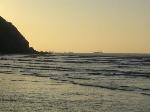
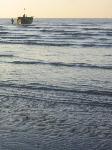
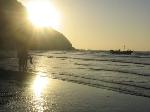
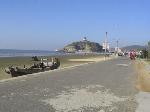
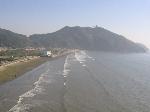
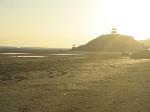
 Copyright © 1998-2026 All rights reserved.
Copyright © 1998-2026 All rights reserved.